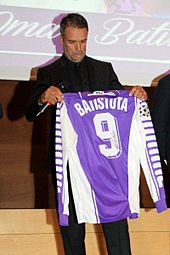Gabriel Batistuta
Gabriel Omar Batistuta (Spanish pronunciation: [ɡaˈβɾjel oˈmaɾ βatisˈtuta];[note 1] born 1 February 1969) is an Argentine former professional footballer.
[9] At international level, Batistuta was Argentina's all-time leading goalscorer with 56 goals in 78 official matches,[note 2] a record he held until 21 June 2016, when he was surpassed by Lionel Messi.
In 2003, after 12 years in Italy, the family moved to Qatar where Batistuta had accepted a lucrative celebrity playing contract with a local team, Al-Arabi, ending his career there in 2005.
[24] Speaking in a television interview in Argentina in 2014, Batistuta said the pain suffered in his ankles after retiring in 2005 became so intense that he "urinated in bed with the toilet only a few steps away.
Because of his height he played basketball, but after Argentina's victory in the 1978 FIFA World Cup, in which he was particularly impressed by the skills of Mario Kempes, he devoted himself to football.
[30] After playing with friends on the streets and in the small Grupo Alegria club, Batistuta joined the local Platense junior team.
Batistuta's two goals drew the attention of the opposition team's coach Marcelo Bielsa, and he signed a professional contract with Newell's in 1988.
However, at the beginning of 1991, Óscar Tabárez became Boca Juniors' new manager and he gave Batistuta the support and put him into his best place in the field, the centre of attack, rather than as an outside forward.
[45][46] In addition to the fans erecting a life-size bronze statue of him in Florence, Batistuta was inducted into the club's hall of fame in 2014.
An emotional Batistuta told the audience at the ceremony: "From the moment I arrived at Fiorentina I wanted a place in the history of the club – and now I can say I have succeeded.
After a promising start in both competitions, the team only reached seventh in the league and were eliminated in the second round group phase of the European tournament.
[55] On 26 November 2000 Batistuta scored an 83rd-minute winner with a right-foot volley from 30 yards in a league game against Fiorentina in Rome – visibly upset having done so he refused to celebrate with his Roma teammates.
[48] Before the match he ran over to the 3,000 Fiorentina fans and saluted them, and did the same at full time, receiving adoration in return, before he left the stadium in tears.
[57] Now aged 34, Batistuta failed to find form with Roma and was loaned out to Inter Milan, scoring two goals in twelve matches, although he did provide assists for Christian Vieri.
[64] During the qualification matches for the 1998 World Cup (with former River Plate manager Daniel Passarella) Batistuta was left out of the majority of the games after falling out with the coach over team rules.
Argentina were knocked out of the World Cup by the Netherlands courtesy of a last-minute Dennis Bergkamp winner after the two sides had been locked at 1–1 for more than 70 minutes.
But Argentina's "group of death" saw the team fall at the first hurdle, only managing a victory against Nigeria (Batistuta scored the match's only goal).
[65] Batistuta admitted he was a little annoyed at losing the record, stating, "You go around the world and people say, 'he's the top scorer for the Argentina national team', before he then added, "But the advantage I have is that I'm second to an extraterrestrial.
"[65] "Batistuta, dubbed "Batigol" by his fans, is the most successful striker of his generation, having achieved mythic status at Italian club Fiorentina in the 1990s before moving to AS Roma.
A quick, hard-working, and powerful player, with an eye for goal and a good all-round game, Batistuta is considered one of the most complete, feared and prolific strikers of his generation.
[7][66][67] As a striker, he was primarily known for his technique, offensive movement off the ball, strength in the air, and powerful, clinical finishing ability with both feet from anywhere on the pitch, despite being naturally right-footed.
And nets.Batistuta also possessed an excellent positional sense, as well as an ability to anticipate defenders in the area, score acrobatic goals from volleys or bicycle kicks, and strike the ball first time from tight angles while on the run.
He was also highly regarded due to his accurate heading and powerful free-kick taking abilities; although he was a competent penalty taker, his conversion rate from the spot throughout his career was less reliable.
[72][73] Batistuta's goal celebration – both arms upturned with his fists clenched – features in his statue placed next to those of Maradona and Messi in an emblematic square in the Recoleta district of Buenos Aires.
